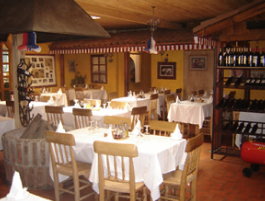If you missed yesterday’s installment, I was talking about this restaurant in Santiago, Doña Tina, that had recently been written up by Ms. Florence Fabricant (that name can’t be real) of the NY Times who wrote that if you want to sample “the hearty, rustic specialties that are considered true Chilean cooking, this sprawling place on the outskirts of the city is surely the best choice.”
So I decide to make a reservation and check it out and when I get there, I’m the lone diner. And they won’t serve me a terremoto so I order a bottle of wine, which is corked, at which point my waiter huffily disappears into the kitchen.
Well, a few minutes later a charming young woman comes out from the back and introduces herself as Karla. She tells me that her uncle, my waiter, had sent her out from the back where she had been doing her homework because she speaks English and he can’t figure out what my problem is.
“He says your wine tastes of dog?” she says.
“It’s corked,” I tell her. “You understand corked?”
She shakes her head. Rather than trying to explain the concept, I say, “It’s just no good.”
“No good?”
“No good,” I tell her. “Taste it.”
She takes a sip, shrugs. “Tastes like wine,” she says. Then adds, “I don’t like wine.”
But Karla goes off and gets me another bottle of wine and while she’s struggling to open it, she tells me that she is one of the “many, many grandchildren” of the owner, Doña Tina. The waiter is her uncle, the bartender is a cousin, her father is a cook. “It cuts down on the stealing,” she says, making a little joke.
When I ask Karla just how many grandchildren Doña Tina has, she shrugs and says, “Maybe 25, maybe 30—it’s hard to keep track.” Then she goes to the bar and comes back with a copy of her grandmother’s cookbook and on the back is a photo of Doña Tina surrounded by her many grandkids. I count 26 but Karla says, “At least five or six are missing.”
When I joke about her following in her grandmother’s footsteps, she says definitely not. “I want to be a civil engineer,” she says. Well, I say, with 25 or 30 cousins, surely the family business will continue.
“Yes, but without me, I hope,” says Karla.
I tell Karla I’m going to have that Chilean classic, pastel de choclo, an oven-baked stew made of diced meat, onion, and chili pepper covered by a sweet corn paste topped with sugar.
“No,” Karla says. “No pastel de choclo. Only in summer.” (Remember that it is mid-winter down here right now.)
“The humitas?” I say.
“No humitas.”
I give up. I tell Karla to just pick something for me. With her pen, she points at the sugerencia especial, the Doña Tina. “This is very good,” she says. “Costillar and arrollado. Have you had arrollado?”
I tell her I have not. She says, “Well, if you have been to Santiago and have not had the arrollado, you have not been to Santiago.”
That’s good enough for me.
When Karla brings the dish from the kitchen, it’s as meat-and-potatoes as you can get. The arrollado is pork that’s been marinated in red wine vinegar and a little garlic, rolled up and covered in a layer of fatty skin and poached. It looks about as appetizing as it sounds. Karla tells me that if you eat the white fat covering it’s called eating the panty. “But not everyone likes to eat the panty.” Including me.
The costillar, pork ribs roasted with cumin and oregano, is a little bit better, but anyone who has ever had some good Kansas City barbecue would immediately tell you that the Chileans need to learn about spice rubs.
The best thing on the plate, as far as I’m concerned, are the corn-colored pureed potatoes flavored with merken, the Mapuche spice of smoked chile peppers and coriander seeds. Frankly, I would have been perfectly happy to skip the costillar and arrollado, along with the panty, and just sup on a big bowl of the mashed potatoes with merken. If only I could have gotten a decent wine to go with it. Or a good terremoto.


Recent Comments